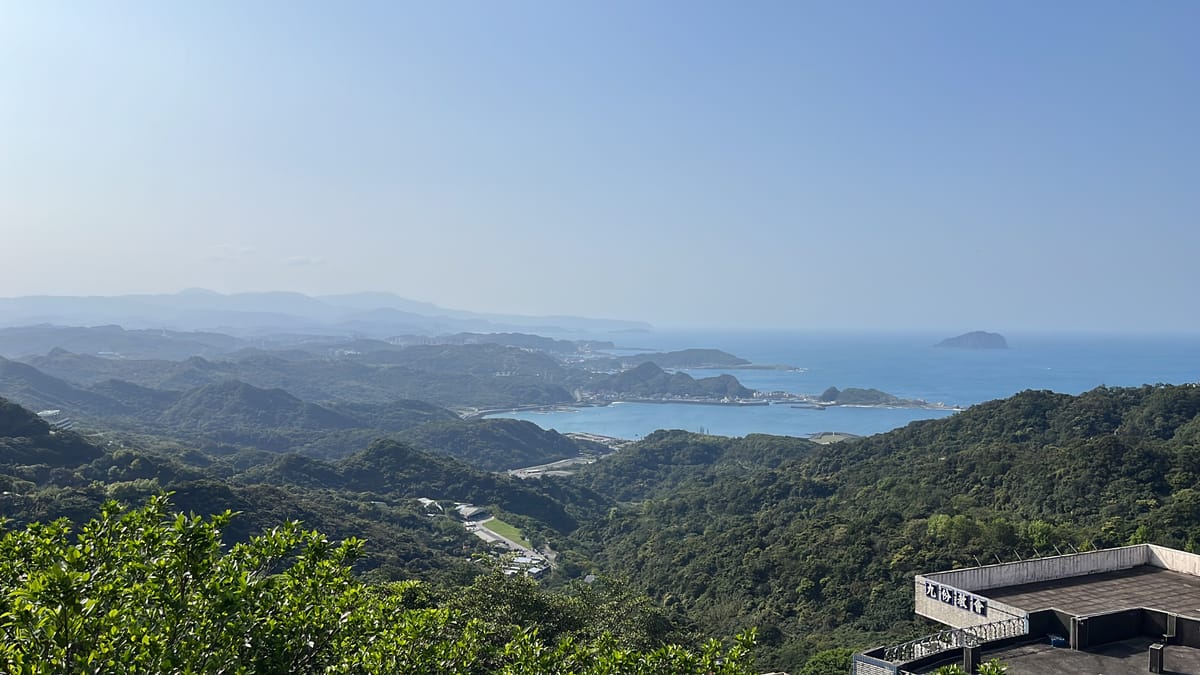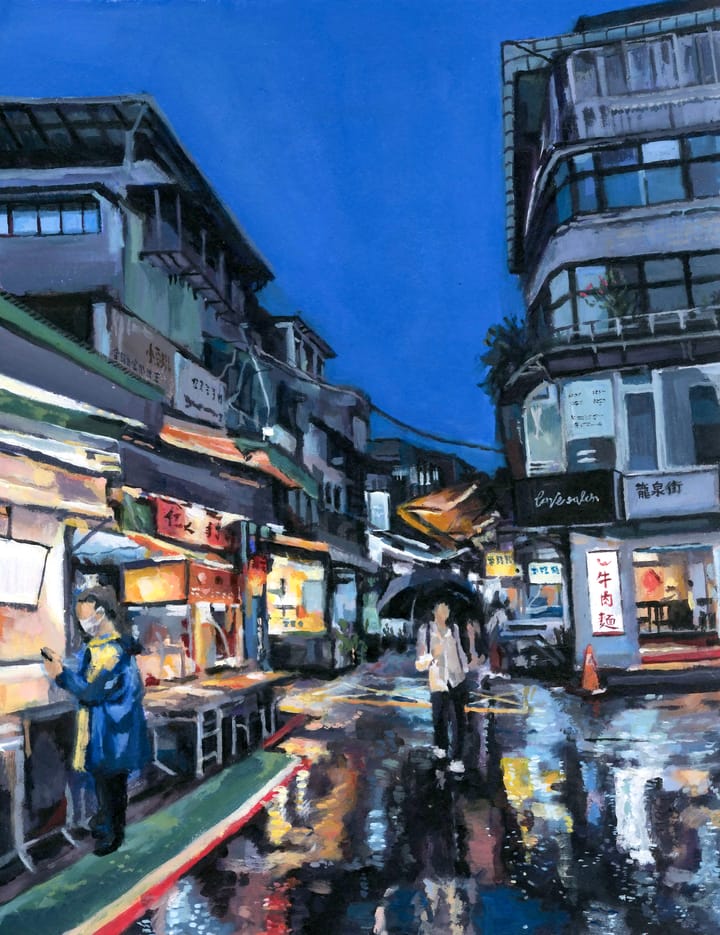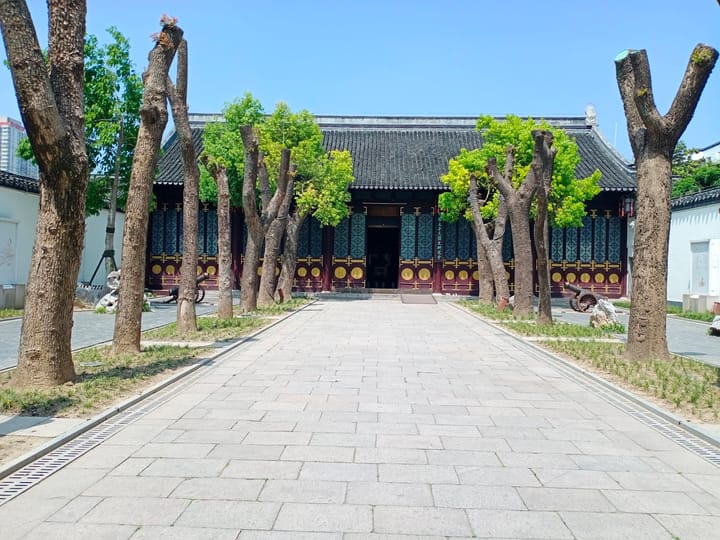#8 Why I Want to Study China

Hi friends! I'll dispense with my now-standard apology to begin these newsletters. Yes, it's been far too long since I've graced your inbox with a new edition, but hopefully this jumbo-sized newsletter somewhat makes up for my absence this past month.
First, a brief detour into Chinese Learning Corner before I devote the bulk of this newsletter to something I've been thinking a lot about recently: why I want to study, not just Chinese, but China itself and what it is about this current fraught moment in U.S.-China relations that leaves me feeling driven to keep studying.
And then, of course, I have a whole lot of reading recommendations!
Let's get into it!
Chinese Learning Corner
Everyone says learning Chinese at ICLP is no walk in the park and that has certainly been my experience this past month, as my workload has increased and the Chinese I'm learning has gotten more formal and abstract. I'll give you a brief example. In the first few months of learning a language, your vocabulary includes everyday items (bed, table, phone, chair) and maybe even some more advanced concepts (diploma, interest rate, swimming pool). Having trudged my way past that step, I now am dealing with vocabulary that looks something like this:

That first phrase—透不過氣來 (tòu bùguò qì lái)—like many Chinese idioms, is wonderfully literal. It directly means that "breath cannot pass" and, as a figure of speech, can mean that you are so stressed that you "feel suffocated." In my textbook, this phrase is used to express how, when experiencing inflation, people with a fixed income 壓得透不過氣來 (yā dé tòu bùguò qì lái), which means their pressure (or stress) is intense enough to the point of not being able to breathe.
This kind of language does not spontaneously emerge from my Chinese-language-learner brain. I'd more readily say something a bit simpler, such as 我的壓力很大 (Wǒ de yālì hěn dà), which means "I have a lot of stress." But advancing as a language learner is, in many ways, not just knowing how to communicate something, but knowing how to communicate it in a way that corresponds with how native speakers actually talk. This step has definitely been a bit of a challenge for me, but the few moments when I do clear this threshold help make the whole experience feel more worth it.
Why I Want to Study China
Most of the close friends and family members in my life understand vaguely that I want to "study" China. Maybe they even know that I particularly want to study Chinese politics and the way policy is formulated and implemented in contemporary China. But, I'm sure, some level of confusion persists for the very understandable reason that...well, what on Earth does China have to do with my life and my upbringing?
This is a question I've had to address a lot recently—in scholarship applications, job interviews, and daily conversations with new friends. And the truth is: that answer has changed somewhat as my knowledge of China (and Chinese) has grown and as the U.S.-China relationship has gotten increasingly tense. I thought it might be worth taking some time to sketch out why I'm so intent on studying China and why, frankly, we need more Americans to do the same.
The start of a new Cold War
Back in 2019, when I was a national security reporter for Mother Jones, I slipped inside a ballroom on Capitol Hill to watch the launch of a group calling itself the "Committee on the Present Danger: China." The event, which consciously evoked the name of a Cold War-era anti-communist group, included speeches from such luminaries as January 6 cheerleader Steve Bannon and anti-Muslim gadfly Frank Gaffney.
There was a sense then, which is clear from the article I ultimately wrote after the event, that this event augured something new in American politics. No longer was China a friend who we could cheer on despite political differences or even necessarily a competitor. China had become, at least to Bannon, “the greatest existential threat we’ve ever had."
Growing up after 9/11, most Americans had a sense of what our country's leaders saw as our primary "threats" and China certainly did not crack the list. As recently as 2019, the same year I watched Bannon's speech, a majority of Americans viewed China favorably, per Gallup. That seems like a distant memory now. A stunning 84 percent of Americans now have an unfavorable of China, more than at any other period, even after the 1989 Tiananmen Square massacre.
I am not blind to China's many flaws or the cruelties inherent to its authoritarian system. I certainly have no tolerance for those on the Left who, in an effort to deflect criticism from China, deny the Chinese government's various human rights abuses, particularly its ongoing oppression of Uyghurs. But what concerns me is the speed and seeming recklessness of this plunge the United States has taken into a new Cold War, all but ignoring the many ways in which a "second Cold War" can be far more destructive and difficult to resolve than the first. Here's a selection of headlines that should make clear what I mean:
December 14, 2021: "China Initiative Set Out to Catch Spies. It Didn’t Find Many"
April 3, 2023: "Chinese Americans fight for their place in Texas as lawmakers push restrictions on foreign land ownership, social media platforms"
December 19, 2023: "Bilateral Tensions Cause the Number of American Students in China to Plummet"
March 14, 2024: "Chinese students, academics say they’re facing extra scrutiny entering U.S."
This is, quite simply, the stuff of another Red Scare. And that is not even including the ongoing effort to ban an app that over 150 million Americans, including (apparently!) Joe Biden, use. There is no doubt that U.S. politicians need novel ways to confront a newly assertive China and I am sympathetic to efforts to delink some supply chains from China and assist Hong Kongers, Uyghurs, and Tibetan refugees fleeing government oppression. But I've also seen what happens when the United States loses its mind during a national security panic and the result is never good—not for the countries the U.S. devastated abroad during the War on Terror or the Muslim Americans who faced discrimination and harassment at home.
I am writing this from Taiwan, a place where aggression from China is a constant, real threat. And my area of study focuses on China's borderlands, places where ethnic Uyghurs and Tibetans have faced persistent oppression and forced attempts at assimilation by the Chinese Communist Party and its predecessor governments. All of which is to say: I am no apologist for China's government or even remotely optimistic about its chances for political reform. Yet I am an American and it seems important, as someone with an interest in studying China, to identify what is happening now in our politics and how, whenever we've gone down the path of fear-mongering and paranoia, it never ends well.
Fewer opportunities to study China
In case you needed another reminder of how much things have changed: In 2011-12, China welcomed roughly 150,o00 students from the United States. Last year, just 350 Americans studied in China. U.S. journalists who cover China were barred from the mainland in 2021 and now must analyze a country of 1.4 billion people without direct access to the country itself.
Getting to China for any reason at all has gotten more difficult and, once you're there, must contend with omnipresent surveillance, Internet censorship, and a confluence of befuddling protocols. In a country where payment apps are ubiquitous, it was not until recently that Alipay became easy to use for foreigners who are not willing to verify their ID. (In the past, that process could take several days and make it all but impossible to pay for things—a terrible turn of events if you're a tourist on a short trip.)
All of these factors have made fewer foreigners willing to go to China. Even someone like me, who is eager to go, opted to study at a language program in Taiwan, where I have no restrictions on what I say or write and no fear of running into issues with acquiring or maintaining a visa. (All U.S. citizens can enter Taiwan visa-free for 90 days.)
This environment is far from ideal, which is why when I speak to other academics in the field, they tend to express some degree of pessimism about the future of China studies in the United States. If accessing the country is only going to get harder, what ability is there to conduct rigorous research? And, given the political environment I outlined above, is there even room for serious scholarship that goes against the prevailing political trends?
I'm not sure and, frankly, am not incredibly encouraged. My area of interest is even more difficult, given that travel to China's borderlands is not easy for foreigners and direct access to residents for interviews is all but impossible. These restrictions make it even more incumbent on me to read Chinese fluently so I can better comprehend policy changes in these regions and the discourse about them among Chinese scholars. But it's true: this is a discouraging time for people interested in Chinese politics and, for someone new to the field like me, it definitely has the feeling of entering a party after the DJ has packed up and all the guests are beginning to leave.
Despite there being significant reasons to feel discouraged about the state of the field, I can't help but see these obstacles as a reason to persevere. We cannot lose the remaining opportunities we in the United States have to engage with China. And I hope, in some super small way, that the window for these connections will not close completely.
Odds and Ends
1.
Outside of my schoolwork, I've had the opportunity to dive into some really good books lately, many of which have been (shocker!) about China. For a long time, I've enjoyed Peter Hessler's reporting about China in the New Yorker, but his first book River Town: Two Years on the Yangtze is really a delight.
Hessler writes about his two years teaching at a small Chinese college in Sichuan province in the mid-1990s, a time when China was in the midst of its economic boom but also in many ways still reckoning with the aftermath of the Mao years and the influx of more foreigners. I love how Hessler captures his students' personalities and shows himself, in sometimes brutal honesty, as their mentor and often the butt of their jokes. (His slow-and-steady effort to learn Chinese is certainly relatable as well.)
One of the more difficult things to do as a foreigner studying or working abroad is present the full range of your personality to someone you can only communicate with in your second language. One of this book's many compelling subplots is how Hessler comes into his own, not just as a teacher, but as a Chinese-language speaker. His growing comfort in the language allows the people around him to reveal more about their own personalities and desires. That in itself is another joy of learning a second language: being able to understand people on their own terms.
2.
Some of the other best things I've read recently:
- "Peking Duck," a short story by Ling Ma, which I discovered recently and absolutely loved. Ma plays with perspective and memory to craft a story about a Chinese American writer, her mother, and the differences in how they communicate and portray their experiences. It's quite meta, which may not be for everyone, but I found it incredibly moving.
- "Why Don't We Just Kill the Kid in the Omelas Hole," by Isabel Kim, who has been setting the sci-fi writing world ablaze recently. I am biased because Isabel is a college classmate (and also hosts a wonderful podcast with another far-too-talented friend from college, Amanda Silberling), but this story is one of my favorites because it both modernizes and pokes at the classic Ursula K. Le Guin piece, "The Ones Who Walk Away From Omelas." If you've read that piece, you'll be familiar with the philosophical conundrum at its center: would you accept paradise at the cost of letting one, innocent child suffer? Calling Isabel's story a response to that Le Guin piece is accurate, but also undersells the inventiveness of her writing, which makes her story feel very much of today's moment. Read it (and everything else Isabel writes)!
- "Decolonizing the ‘One China’ Narrative: The Case of Taiwan," by Catherine Lila Chou. Just eight pages long, this sprightly essay packs in a wealth of history and context to explain Taiwan's unique status as a fundamentally independent state despite current and historical claims on its sovereignty from the People's Republic of China and the Kuomintang government (which ruled Taiwan as an authoritarian state from 1945 to the late 1980s). Chou's article is part of a roundtable in The Historical Journal titled "Decolonizing Chinese History," which I really recommend. A lot of the ideas discussed in this roundtable, which complicate traditional conceptions of Chinese history, have gained purchase in the academy, but are less prevalent in popular discourse about China. (For example, anyone who tells you China has been a continuous state for 5,000 years or has been mostly "peaceful" for that span of time is leaving out a LOT of details.)
3.
Some capsule reviews of the TV and movies I've been able to watch recently:
- Anyone but You: there should be 10 movies like this per year. Little of it makes sense—which is saying something, given that it's ostensibly a Shakespeare adaptation—but not once did I want this movie to be anything other than what it was: a vehicle for beautiful people to be movie stars. Would watch again in a heartbeat!
- Dune 2: fantastic, if just a little too on the nose with its theme and point of view. I already enjoyed the first Dune plenty but was more impressed this time around with the synthesis of Hans Zimmer's score, the cinematography, and the eerie nature of Paul's ultimate "victory," all of which have me pumped for a third movie.
- 3 Body Problem: I'll reserve judgment until I've watched more episodes, but am pleasantly surprised so far with the changes Netflix made to some particularly knotty source material. Everyone loves to pick on David Benioff and D.B. Weiss for how they messed up Game of Thrones, but given that this book series has actually concluded, I have more confidence that they'll be able to stick the landing. Also, am curious if there has been, at least recently, a prominent work of popular culture for a mostly Western audience that has so prominently featured the Cultural Revolution.
4.
One of the (many) cringey things that I do as a student in Taiwan is get far too excited when I have friends come visit. Thankfully, I've been spoiled in this regard with Georgetown pals Georgina and Jada coming from Japan and my American friends, Nick, Delaney, and Kelly staying in Taiwan this past week.
No less an authority than Confucius famously said: "Is it not a pleasure to have friends come from afar?" (有朋自遠方來,不亦樂乎 // Yǒu péng zì yuǎn fāng lái, bù yì lè hū).
A pleasure indeed!
Back in your inbox soon, everyone :)


